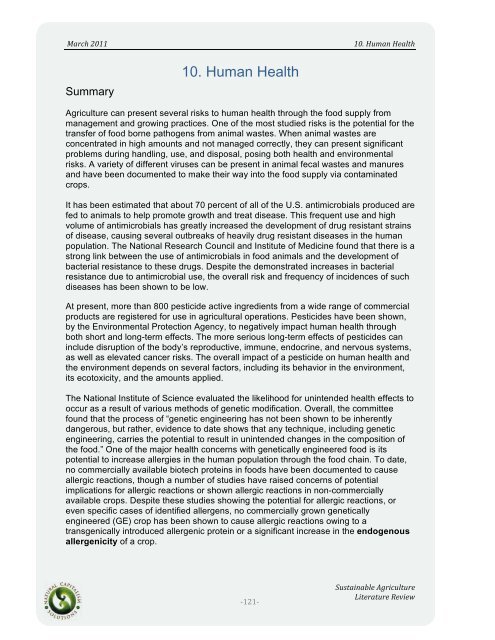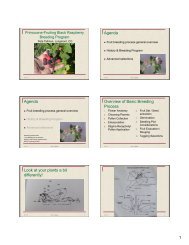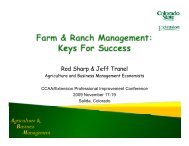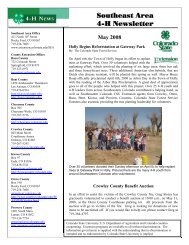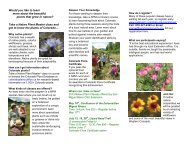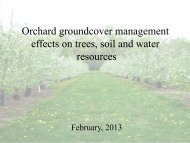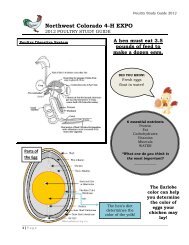Sustainable Agriculture Literature Review - Boulder County
Sustainable Agriculture Literature Review - Boulder County
Sustainable Agriculture Literature Review - Boulder County
You also want an ePaper? Increase the reach of your titles
YUMPU automatically turns print PDFs into web optimized ePapers that Google loves.
! !!<br />
"#$%&!'())!! !!!!!!!!!!!!!!!!!!!!!!!!!!!!!!!!!!!!!!!!!!!!!!!!!!!!!!!!!!!!!!!)(+!03B#5!01#/2&!<br />
Summary<br />
!<br />
10. Human Health<br />
<strong>Agriculture</strong> can present several risks to human health through the food supply from<br />
management and growing practices. One of the most studied risks is the potential for the<br />
transfer of food borne pathogens from animal wastes. When animal wastes are<br />
concentrated in high amounts and not managed correctly, they can present significant<br />
problems during handling, use, and disposal, posing both health and environmental<br />
risks. A variety of different viruses can be present in animal fecal wastes and manures<br />
and have been documented to make their way into the food supply via contaminated<br />
crops.<br />
It has been estimated that about 70 percent of all of the U.S. antimicrobials produced are<br />
fed to animals to help promote growth and treat disease. This frequent use and high<br />
volume of antimicrobials has greatly increased the development of drug resistant strains<br />
of disease, causing several outbreaks of heavily drug resistant diseases in the human<br />
population. The National Research Council and Institute of Medicine found that there is a<br />
strong link between the use of antimicrobials in food animals and the development of<br />
bacterial resistance to these drugs. Despite the demonstrated increases in bacterial<br />
resistance due to antimicrobial use, the overall risk and frequency of incidences of such<br />
diseases has been shown to be low.<br />
At present, more than 800 pesticide active ingredients from a wide range of commercial<br />
products are registered for use in agricultural operations. Pesticides have been shown,<br />
by the Environmental Protection Agency, to negatively impact human health through<br />
both short and long-term effects. The more serious long-term effects of pesticides can<br />
include disruption of the body’s reproductive, immune, endocrine, and nervous systems,<br />
as well as elevated cancer risks. The overall impact of a pesticide on human health and<br />
the environment depends on several factors, including its behavior in the environment,<br />
its ecotoxicity, and the amounts applied.<br />
The National Institute of Science evaluated the likelihood for unintended health effects to<br />
occur as a result of various methods of genetic modification. Overall, the committee<br />
found that the process of “genetic engineering has not been shown to be inherently<br />
dangerous, but rather, evidence to date shows that any technique, including genetic<br />
engineering, carries the potential to result in unintended changes in the composition of<br />
the food.” One of the major health concerns with genetically engineered food is its<br />
potential to increase allergies in the human population through the food chain. To date,<br />
no commercially available biotech proteins in foods have been documented to cause<br />
allergic reactions, though a number of studies have raised concerns of potential<br />
implications for allergic reactions or shown allergic reactions in non-commercially<br />
available crops. Despite these studies showing the potential for allergic reactions, or<br />
even specific cases of identified allergens, no commercially grown genetically<br />
engineered (GE) crop has been shown to cause allergic reactions owing to a<br />
transgenically introduced allergenic protein or a significant increase in the endogenous<br />
allergenicity of a crop.<br />
"'('"<br />
!,342#.5#6/1!78$.%3/23$1!<br />
9.21$#23$1!:1;.1


